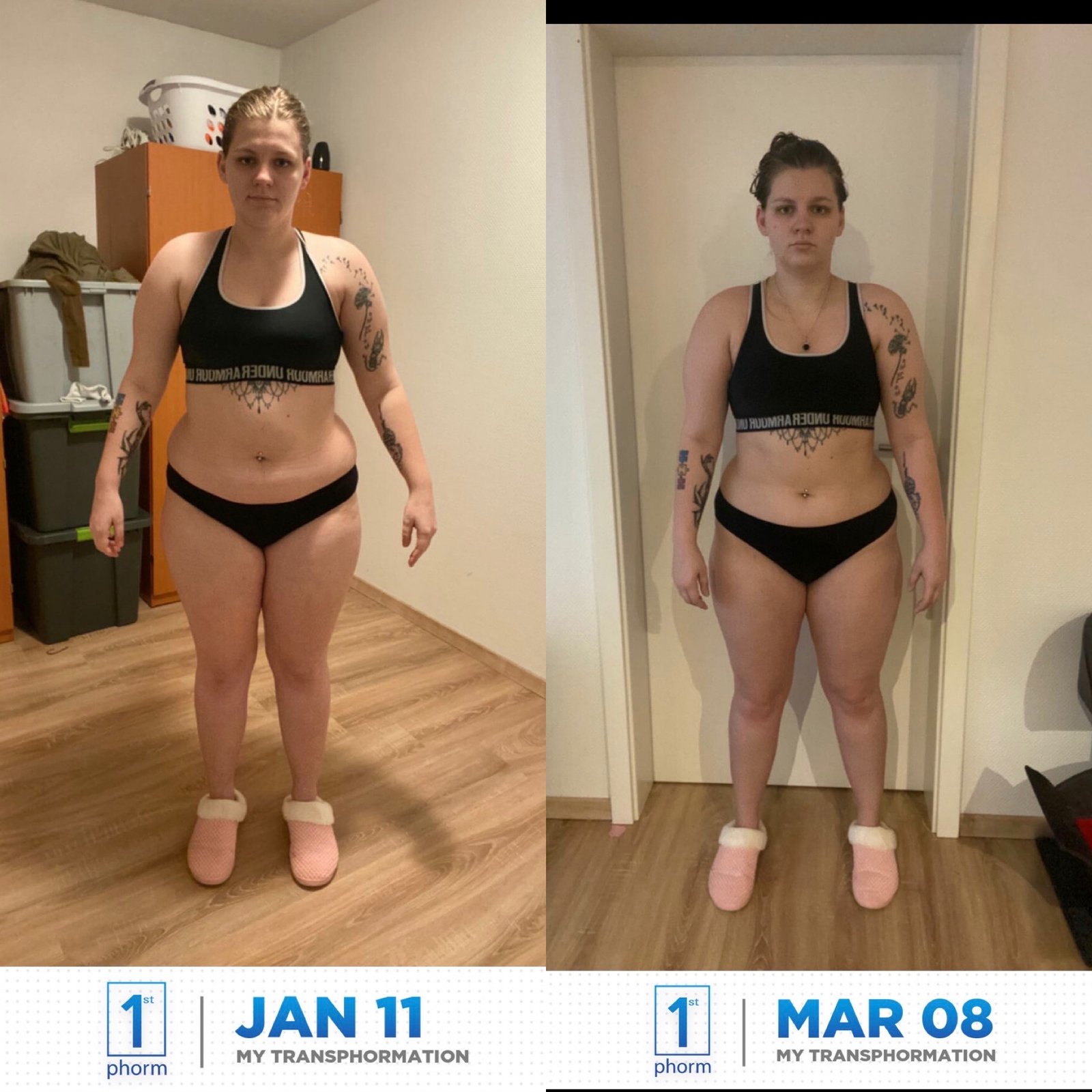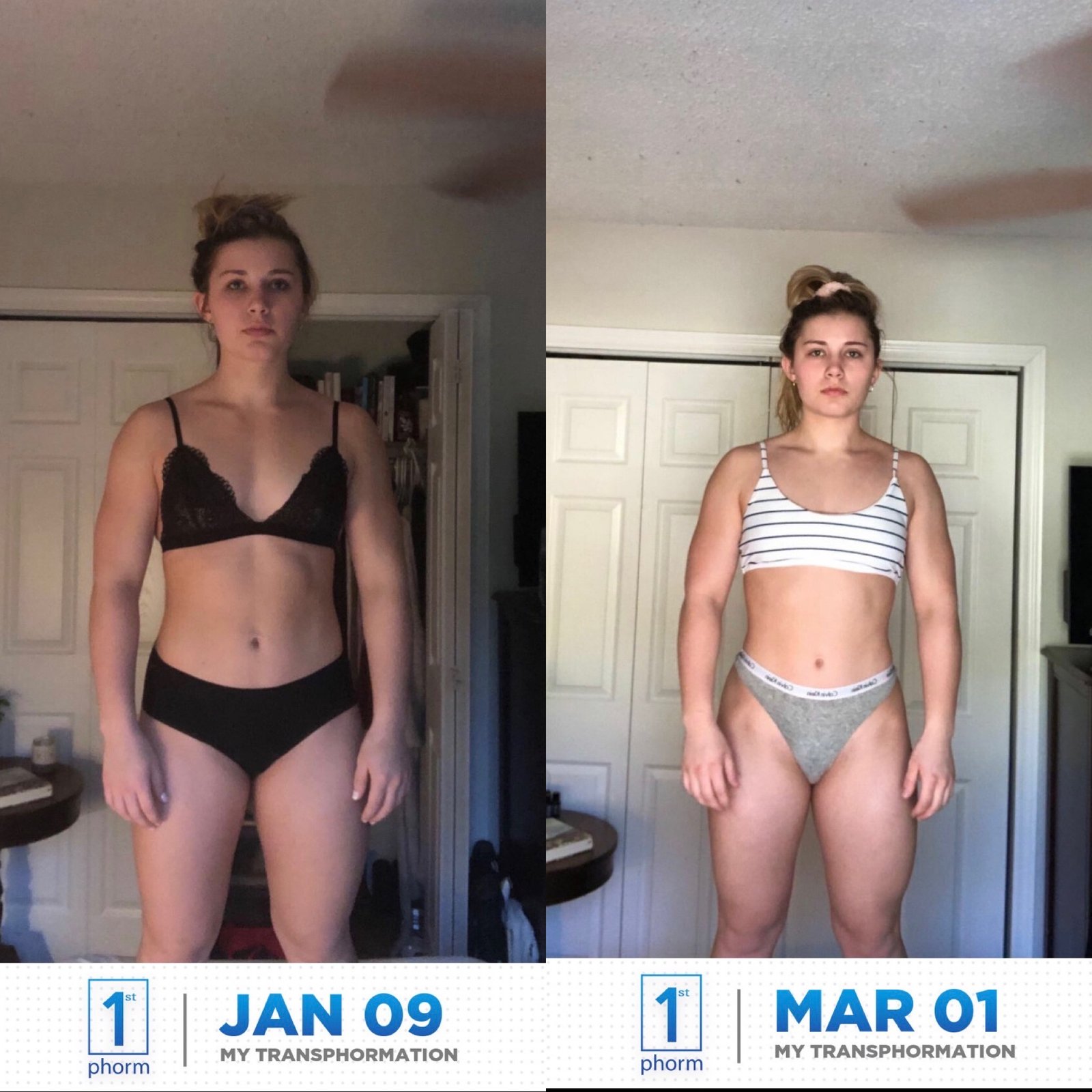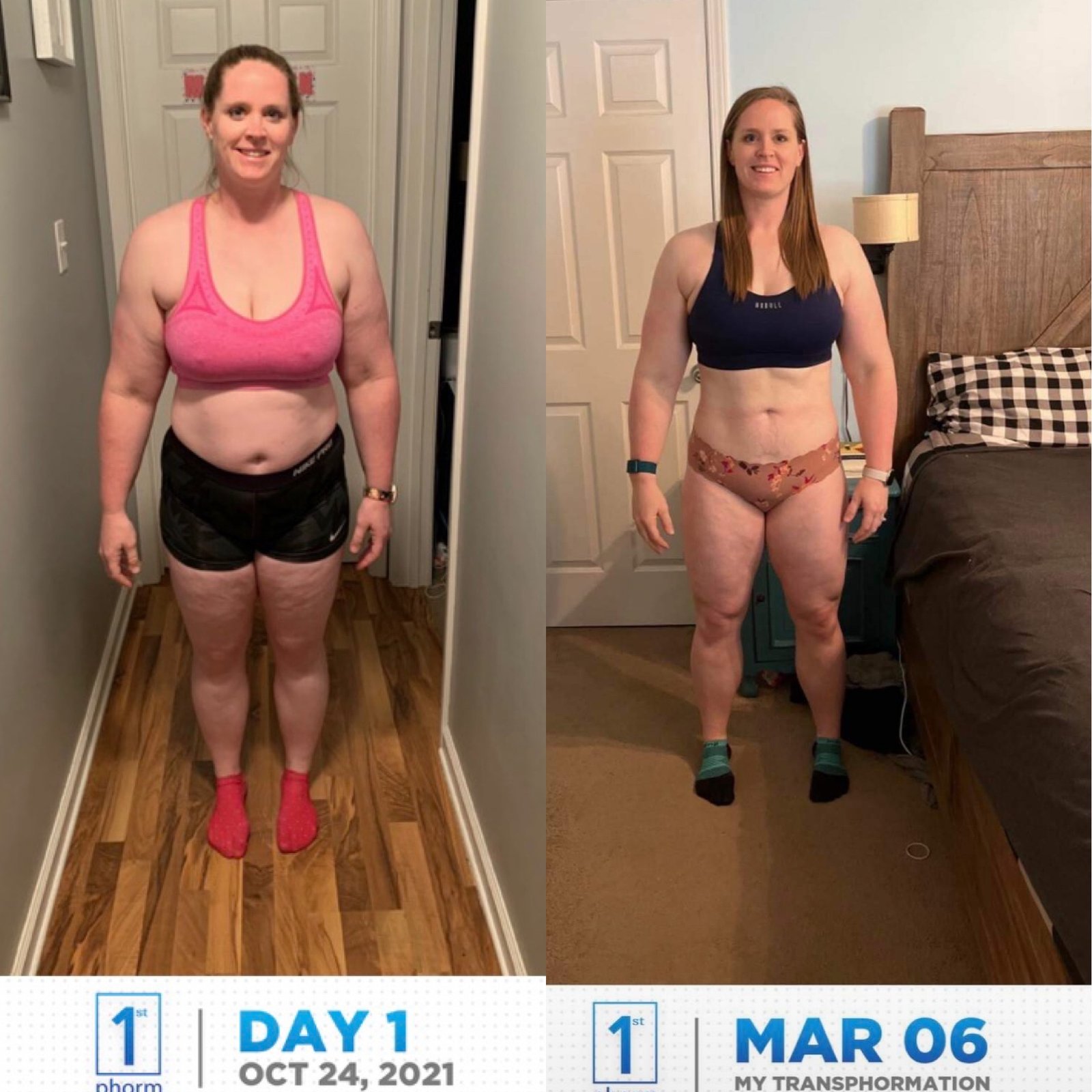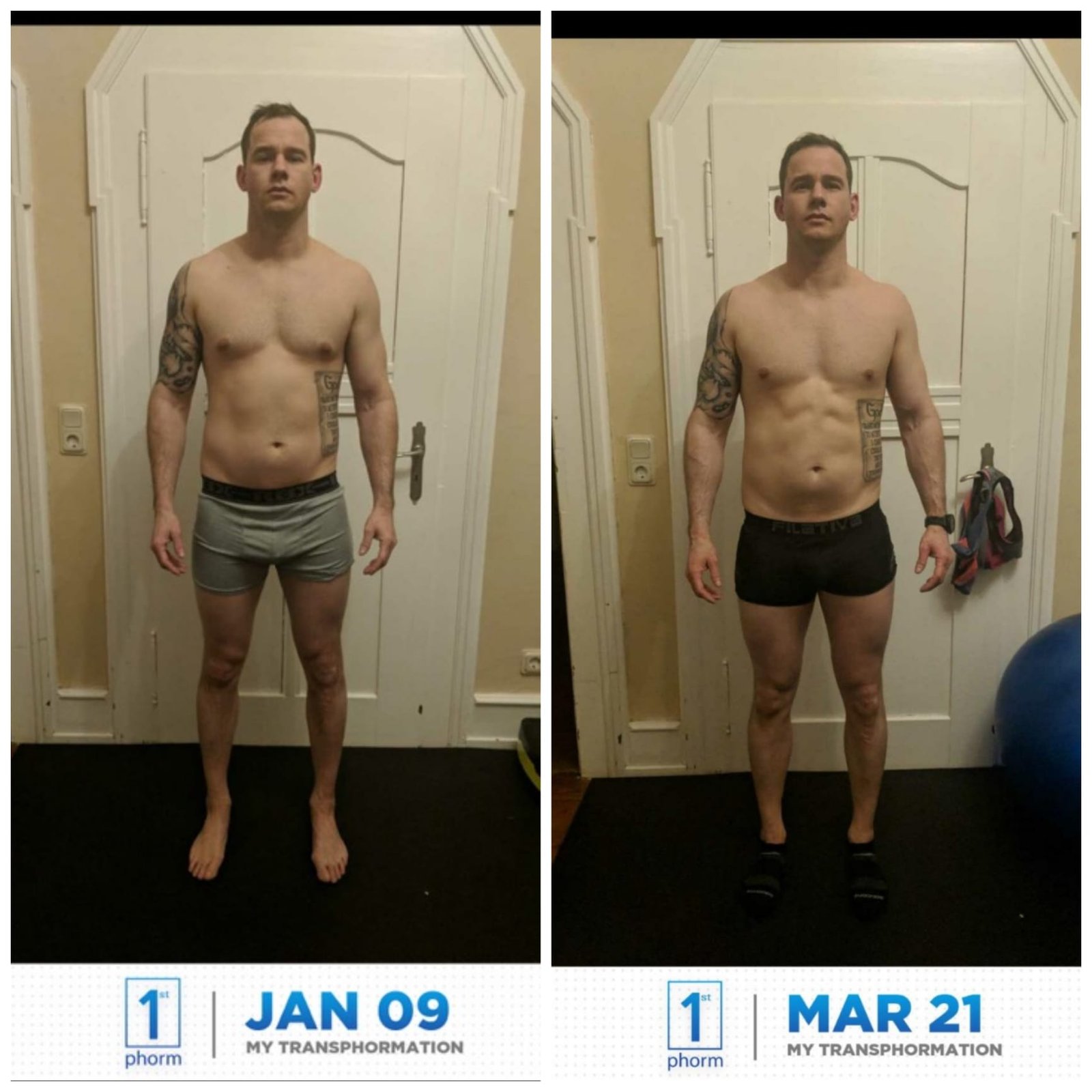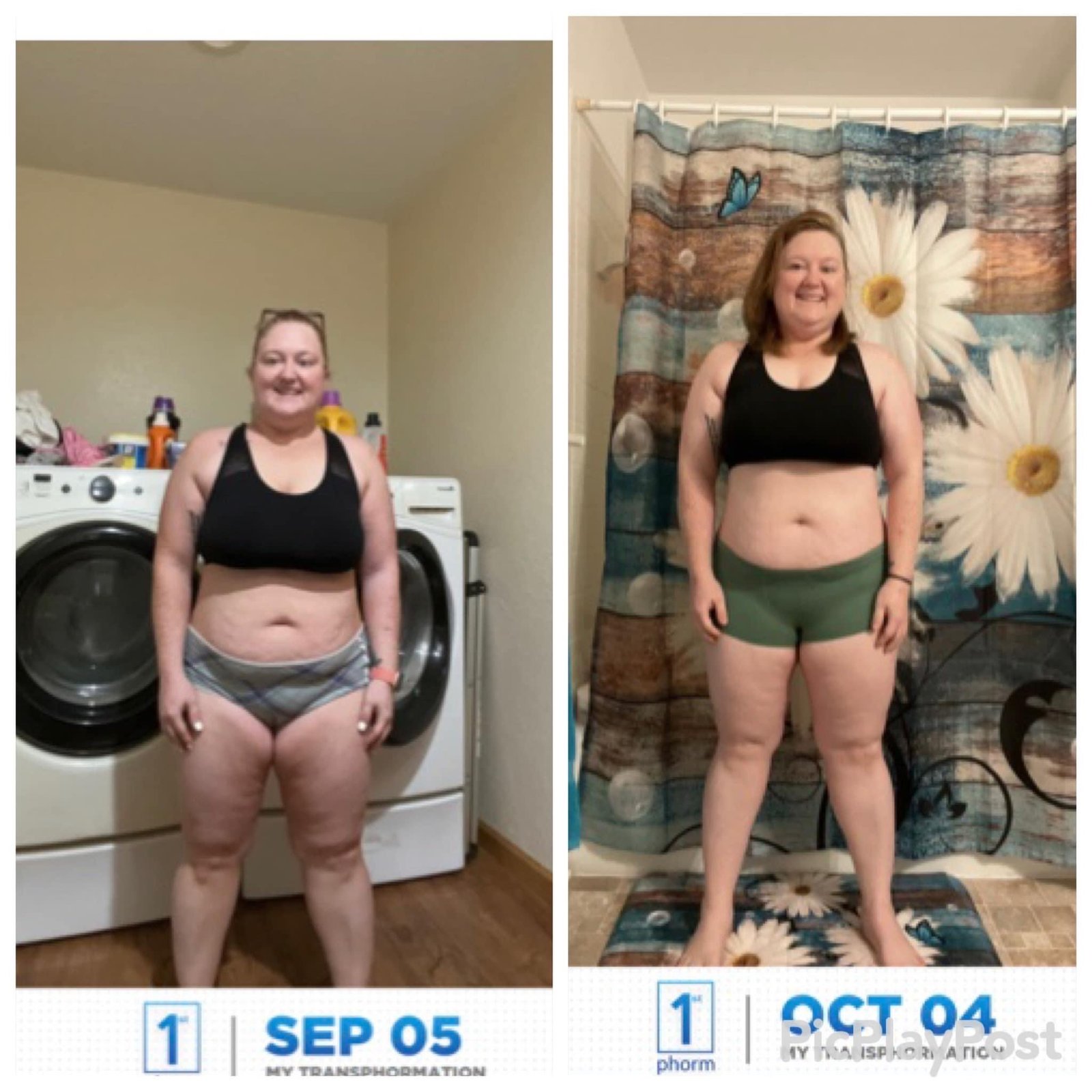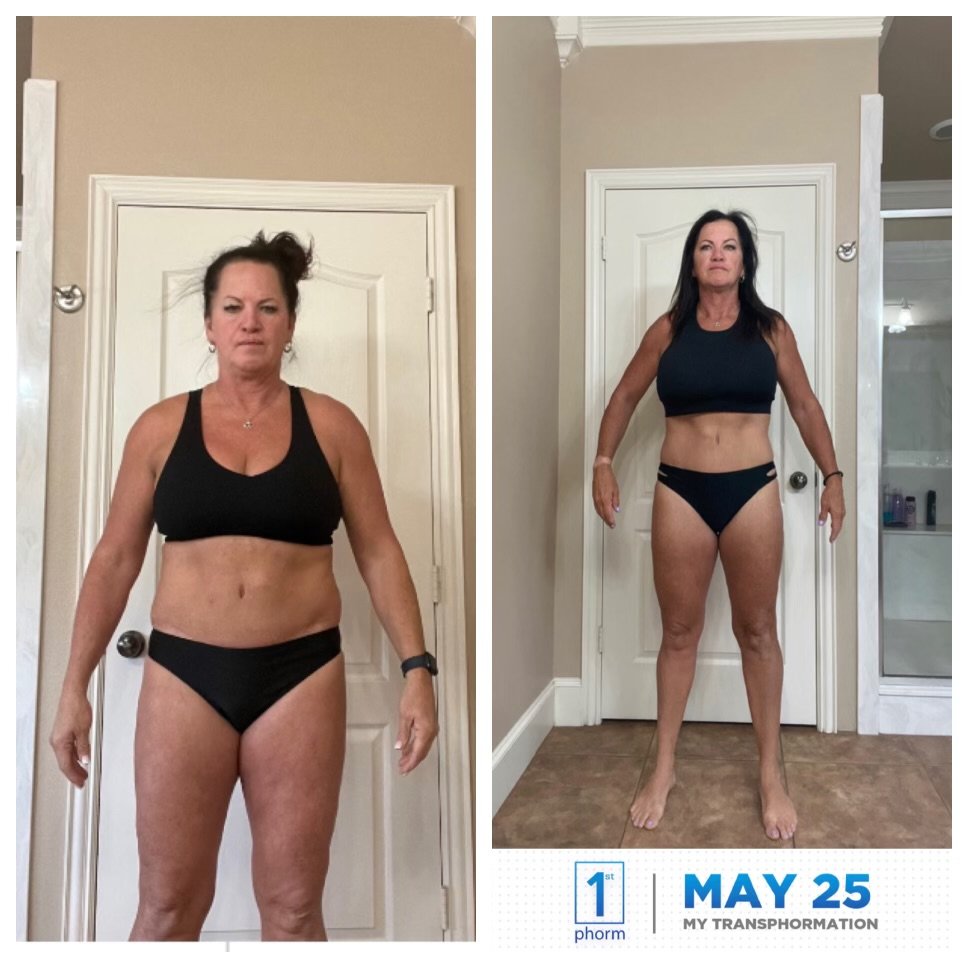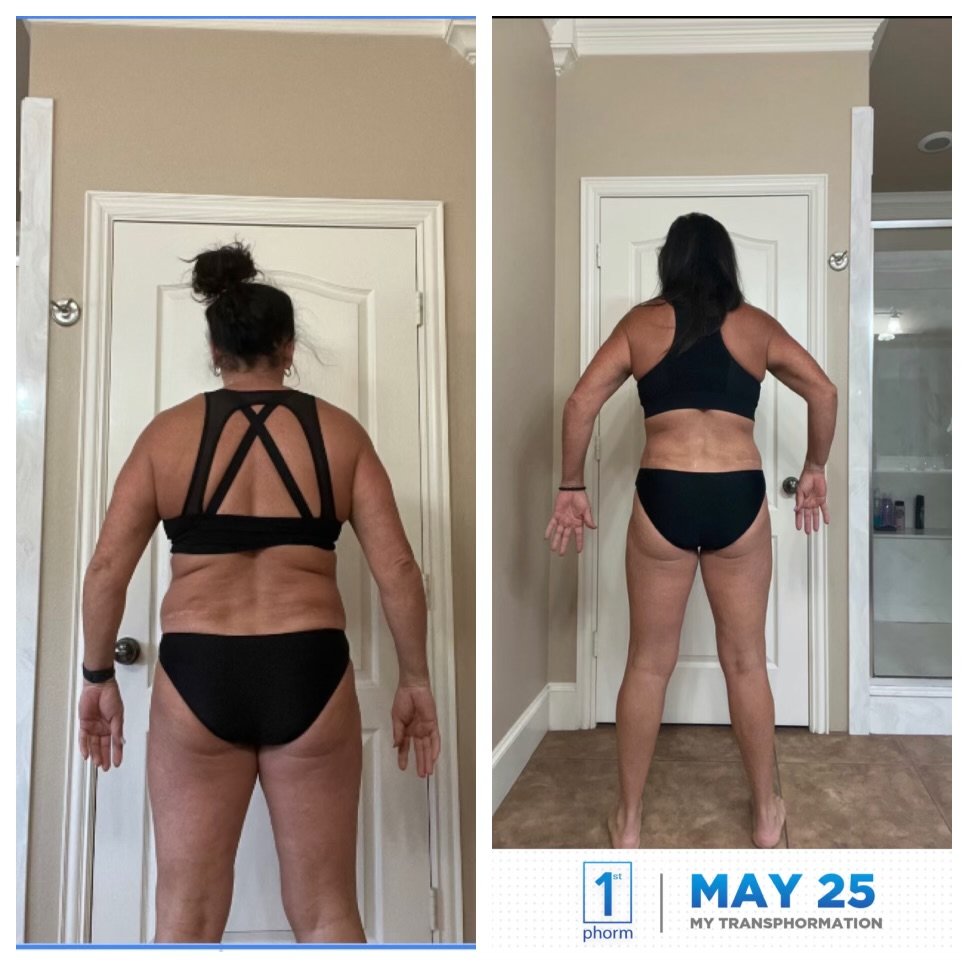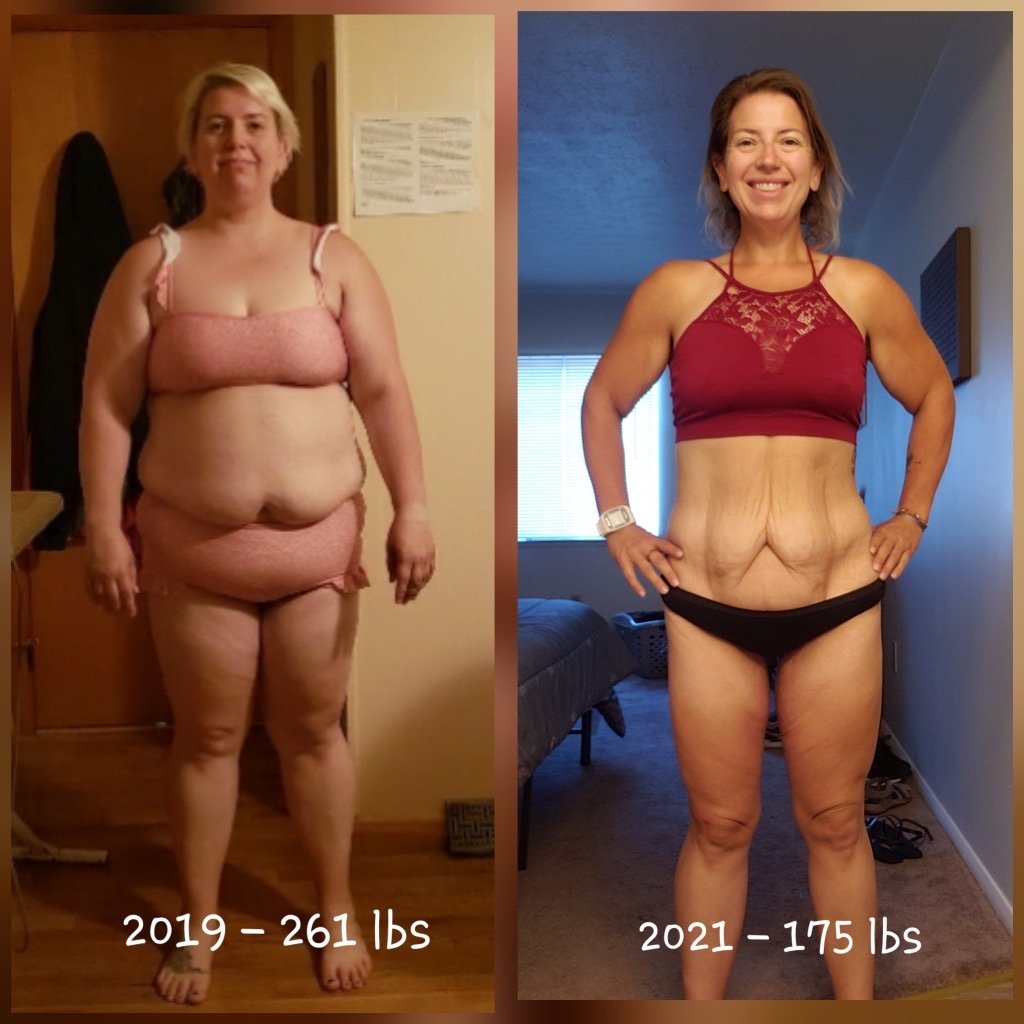The impact of nutrition on weight loss and how to fuel your workouts for optimal results cannot be overstated. To achieve your fitness goals, you must understand the role of nutrition and its impact on weight loss. Proper nutrition is crucial for fueling your body effectively and maximizing your workout results.
Weight loss is a complex process that involves creating a calorie deficit, and nutrition plays a vital role in achieving this deficit. The food you eat provides your body with the energy it needs to function, and the right types and amounts of nutrients can help you burn fat and gain muscle.
In this article, we will explore the science behind weight loss and nutrition, the importance of a well-balanced meal plan, and the significance of pre- and post-workout nutrition. We will also discuss the role of hydration and supplementation in achieving optimal fitness results.
Key Takeaways:
- Nutrition plays a crucial role in weight loss and achieving optimal workout results.
- Creating a calorie deficit is essential for weight loss, and nutrition is a significant factor in achieving this deficit.
- A well-balanced meal plan tailored for weight loss is essential for maximizing weight loss results.
- Pre- and post-workout nutrition are crucial for optimizing energy levels, stamina, and overall performance.
- Hydration and supplementation can enhance weight loss and workout performance.
Understanding the Basics of Weight Loss
Weight loss is a common fitness goal for many people, but understanding the basics is crucial for achieving success. At the core of weight loss is the concept of a calorie deficit, which occurs when you consume fewer calories than your body needs to maintain its current weight.
Creating a calorie deficit can be achieved through a combination of diet and exercise. For example, reducing your calorie intake by 500-1000 calories per day, while engaging in regular physical activity can lead to a weight loss of 1-2 pounds per week.
To determine your daily calorie needs, you can use an online calculator or consult with a registered dietitian. It’s essential to note that drastic calorie restriction can be harmful to your health. Aiming for a gradual and sustainable decrease in calorie intake is the key to long-term weight loss success.
While reducing calorie intake is necessary, it’s equally important to ensure that the calories you consume are from nutritious foods. A diet rich in whole grains, lean protein, fruits, and vegetables can provide adequate nutrition while supporting weight loss goals.
In summary, weight loss is achieved through a calorie deficit, reducing your calorie intake gradually, and incorporating regular physical activity into your routine. A well-balanced diet consisting of nutritious foods is essential for achieving sustainable weight loss.
The Science Behind Weight Loss and Nutrition
Understanding the science behind weight loss and nutrition is crucial for achieving optimal results. Our metabolism, the process by which our body converts food into energy, plays a significant role in weight loss.
When we consume food, our body breaks down the macronutrients – carbohydrates, proteins, and fats – into smaller molecules that our cells can use for energy production. The amount of energy our body requires depends on various factors, such as age, gender, weight, and physical activity level.
The energy we consume through food that is not used for immediate energy production is stored as fat. To lose weight, we need to create a calorie deficit, which means consuming fewer calories than our body needs. This forces our body to use stored fat for energy, resulting in weight loss.
However, creating a calorie deficit through nutrition alone may not be enough for sustainable weight loss. Regular physical activity, such as cardio and strength training, can help increase our metabolism and burn more calories even at rest.
The Role of Metabolism in Weight Loss
The science behind weight loss involves a complex interplay of various factors. One of the key factors is metabolism, which refers to the chemical processes in our body that convert food into energy.
Metabolism is influenced by several factors, including genetics, age, and body composition. People with a higher muscle mass tend to have a higher metabolism as muscles require more energy for maintenance and growth. Age also plays a role as metabolism tends to slow down with age, leading to reduced energy expenditure.
One way to boost metabolism is through proper nutrition. Many foods have been shown to increase metabolism, such as protein-rich foods, whole grains, and spices like cayenne pepper. Additionally, regular physical activity can also help increase metabolism and burn more calories.
The Impact of Nutrition Science on Weight Loss
Advancements in nutrition science have shed light on the impact of different nutrients on our metabolism and weight loss. For instance, research has shown that a diet high in protein can increase metabolism and reduce appetite, leading to less calorie intake and weight loss.
Similarly, consuming a diet high in fiber has been linked to improved weight loss results as it keeps us feeling full for longer periods, reducing the likelihood of overeating.
On the other hand, consuming high amounts of saturated and trans fats has been linked to increased weight gain and health conditions such as heart disease and diabetes. Thus, it is important to focus on consuming nutrient-dense foods that provide the necessary vitamins, minerals, and energy without excess calories and unhealthy fats.
“A well-rounded diet, rich in protein, fiber, and essential vitamins and minerals, is essential for sustainable weight loss and optimal overall health.”
Overall, the science behind weight loss and nutrition highlights the importance of creating a calorie deficit through proper nutrition and regular physical activity. By understanding how various nutrients impact our metabolism, we can tailor our diet to support weight loss and overall health.
Designing a Well-Balanced Meal Plan for Weight Loss
Creating a well-balanced meal plan is essential to achieve successful weight loss results. It is crucial to ensure that your body receives the necessary nutrients to fuel your workouts and prevent any nutrient deficiencies.
When planning your meals, it is essential to incorporate a variety of foods from each food group, including:
- Lean Proteins such as chicken, fish, and legumes
- Whole Grains such as brown rice, quinoa, and whole-wheat bread
- Fruits and Vegetables, including leafy greens, berries, and cruciferous vegetables like broccoli
- Healthy Fats, such as avocado, nuts, and seeds
It is recommended to follow portion control to achieve a calorie deficit and support weight loss. The ideal portion sizes vary based on an individual’s caloric needs and goals. It is advisable to consult with a registered dietician to determine your personalized calorie and nutrient needs.
The Importance of Meal Timing
The timing of your meals is also significant in a well-balanced meal plan. Consuming frequent, small meals throughout the day can help maintain stable blood sugar levels and prevent overeating. It is recommended to consume three main meals and two snacks daily to support weight loss.
It is also essential to fuel your body before and after workouts to maximize performance and recovery. A pre-workout meal should be consumed at least 30 minutes before exercise and should include complex carbohydrates and protein. Rehydration and replenishment after a workout are equally important. A post-workout meal should be consumed within 30 minutes of exercise and should include protein to support muscle growth and repair.
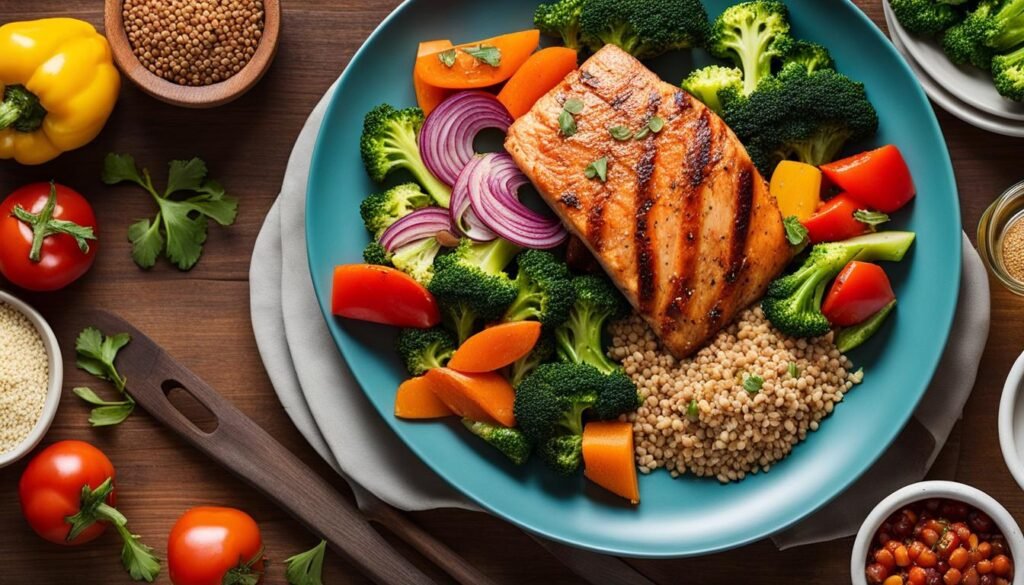
“A well-balanced meal plan is essential for weight loss and optimal workout performance. It should include a variety of foods from each food group and follow portion control to create a calorie deficit.”
Macronutrients and Their Role in Weight Loss
When it comes to weight loss, macronutrients – carbohydrates, proteins, and fats – play a crucial role in achieving your fitness goals. Understanding their respective roles and how to incorporate them into your diet can help optimize weight loss results.
Carbohydrates: Often vilified in popular culture, carbohydrates are an essential part of a healthy diet. They serve as the body’s primary source of energy and play a critical role in fueling workouts. When it comes to weight loss, the key is to focus on complex carbohydrates, such as whole grains, fruits, and vegetables, which are high in fiber and take longer to digest, keeping you fuller for longer. Avoid simple carbohydrates, such as refined sugars and white bread, which provide a quick energy boost but can lead to crashes and cravings later on.
| Good Carbohydrates | Bad Carbohydrates |
|---|---|
| Whole-grain bread | White bread |
| Quinoa | White pasta |
| Brown rice | Candy |
Proteins: Protein is essential for building and repairing muscles, which is especially important when trying to lose weight. It also helps keep you feeling fuller for longer, reducing the likelihood of overeating. Focus on lean protein sources, such as chicken, fish, beans, and tofu, which are low in calories and high in nutrients. Avoid high-fat protein sources, such as processed meats and fried foods, which can sabotage your weight loss efforts.
| Good Proteins | Bad Proteins |
|---|---|
| Grilled chicken | Fried chicken |
| Salmon | Hot dogs |
| Black beans | Processed deli meats |
Fats: Contrary to popular belief, not all fats are bad for you. In fact, healthy fats play a vital role in maintaining cell function and providing energy. Focus on incorporating unsaturated fats, such as those found in nuts, seeds, and avocados, into your diet. Avoid saturated and trans fats, which are found in processed foods and can increase the risk of heart disease and other health problems.
| Good Fats | Bad Fats |
|---|---|
| Avocado | Margarine |
| Nuts | Lard |
| Olive oil | Butter |
Remember, achieving sustainable weight loss is about balance. Incorporating a variety of macronutrients into your diet, while maintaining a calorie deficit, can help you reach your fitness goals effectively. Consult with a healthcare professional or registered dietitian to create a personalized meal plan tailored to your individual needs and preferences.
Micronutrients and their Impact on Weight Loss
While macronutrients play a significant role in weight loss, it’s essential not to overlook the importance of micronutrients. Vitamins and minerals are crucial for maintaining overall health and optimizing metabolism, which in turn can aid in weight loss efforts.
Did you know? A deficiency in certain micronutrients can impact weight loss. For example, inadequate levels of vitamin D have been linked to obesity, while low levels of iron can lead to decreased energy levels and exercise capacity.
The Role of Vitamins in Weight Loss
Vitamins are essential for various bodily functions, including metabolism and energy production. Certain vitamins also serve as antioxidants, helping prevent cellular damage and inflammation. Here are some vitamins that play a significant role in weight loss:
| Vitamin | Role in Weight Loss | Food Sources |
|---|---|---|
| Vitamin D | Regulates appetite and metabolism, promotes calcium absorption for bone health | Fatty fish, fortified dairy products, mushrooms |
| Vitamin B12 | Supports energy production and metabolism | Meat, fish, dairy, eggs |
| Vitamin C | Helps with the production of carnitine, a compound that aids in fat burning | Citrus fruits, berries, peppers, broccoli |
The Role of Minerals in Weight Loss
Minerals are crucial for various bodily functions, including bone health, muscle contraction, and nerve function. They also play a vital role in metabolism and energy production. Here are some minerals that play a significant role in weight loss:
| Mineral | Role in Weight Loss | Food Sources |
|---|---|---|
| Magnesium | Regulates blood sugar levels, aids in fat metabolism | Nuts, seeds, spinach, whole grains |
| Calcium | Plays a role in fat metabolism, supports bone health | Dairy products, leafy greens, fortified plant-based milks |
| Zinc | Helps regulate appetite, supports immune system function | Oysters, beef, pumpkin seeds, lentils |
While it’s essential to incorporate a variety of nutrient-dense foods into your diet, supplements can also be a helpful addition to ensure adequate micronutrient intake. However, it’s crucial to consult with a healthcare professional before adding any new supplements to your diet.
Pre-Workout Nutrition: Fueling Your Body for Optimal Performance
Proper pre-workout nutrition is essential for optimal performance during exercise and achieving your weight loss goals. The right balance of nutrients can provide energy, improve endurance, and increase your overall workout capacity.
Carbohydrates are a crucial component of pre-workout nutrition, providing your body with the necessary glucose for energy. Selecting complex carbohydrates such as fruits, vegetables, and whole grains can provide a steady stream of energy throughout your workout. Avoiding simple sugars ensures you don’t experience a crash during your session.
| Pre-workout foods rich in carbohydrates: | Pre-workout foods rich in protein: |
|---|---|
| Bananas | Greek yogurt |
| Oatmeal | Hard-boiled eggs |
| Berries | Protein shake |
Protein is also an essential component of pre-workout nutrition, helping to repair and rebuild muscles. Consuming protein before your workout can help increase muscle synthesis during exercise. Lean protein sources such as chicken, fish, and tofu are great options.
Hydration is key for optimal performance during exercise. Adequate water intake is crucial to maintain energy levels and prevent dehydration. Drink water consistently throughout the day and consume around 16 ounces of water 30 minutes before your workout.
Overall, pre-workout nutrition plays a crucial role in effective workouts and weight loss. Choosing the right foods and ensuring proper hydration can help increase energy, endurance, and overall performance. Incorporating these habits into your routine can lead to significant improvements in achieving your fitness goals.
Post-Workout Nutrition: Recovery and Muscle Repair
After a challenging workout, your body needs proper nutrition to aid in recovery and muscle repair. The right post-workout meal can help reduce muscle soreness and inflammation while promoting muscle growth. Here’s what you need to know about post-workout nutrition:
The Importance of Protein
Protein is a crucial nutrient for post-workout recovery as it aids in muscle repair and growth. Aim to consume a protein-rich meal within 30 minutes of completing your workout. Lean protein sources such as chicken, fish, tofu, or beans are great options. If you prefer a protein shake, choose one that contains at least 20-30 grams of protein per serving.
Carbohydrates for Glycogen Replenishment
Consuming carbohydrates after a workout can aid in replenishing glycogen stores, which your body uses for energy during exercise. Opt for complex carbohydrates such as whole grains, sweet potatoes, or fruit. These will provide sustained energy and prevent blood sugar crashes.
Hydration is Key
Drinking enough water after a workout is vital for recovery, as it helps transport nutrients to your muscles and promotes muscle repair. Aim to drink at least 16-20 ounces of water per pound of body weight lost during the workout.
| Food | Protein (g) | Carbohydrates (g) | Fat (g) |
|---|---|---|---|
| Grilled chicken breast (3 oz) | 27 | 0 | 3.5 |
| Salmon (3 oz) | 22 | 0 | 8 |
| Quinoa (1 cup) | 8 | 39 | 4 |
| Blueberries (1 cup) | 1 | 21 | 0.5 |
Some great post-workout meal ideas include grilled chicken with roasted sweet potato and green beans, salmon with quinoa and roasted vegetables, or a protein smoothie with banana and spinach.
Don’t forget that proper post-workout nutrition is only one part of an overall healthy diet and fitness routine. Be sure to fuel your body with nutritious whole foods and stay consistent with your workouts for optimal results.
Hydration: The Key to Effective Workouts and Weight Loss
Staying hydrated is essential for achieving your fitness goals. It not only affects your workout performance but also plays a crucial role in weight loss. Dehydration can cause fatigue, dizziness, and reduced stamina, making it challenging to perform any physical activity. Therefore, it is necessary to understand the importance of hydration and its impact on effective workouts and weight loss.
Although the recommended water intake may vary depending on factors such as age, weight, and activity level, a general guideline is to drink at least eight glasses of water per day. However, during intense workouts or hot weather conditions, you may need to consume more to stay hydrated.
| Signs of Dehydration | Effect on Workouts and Weight Loss |
|---|---|
| Dry mouth and throat | Reduced stamina and workout performance |
| Headache and dizziness | Decreased metabolic rate, leading to slower weight loss |
| Dark yellow urine | Increased water retention, hindering weight loss progress |
It is also essential to hydrate before, during, and after exercise to maintain optimal performance. Drinking water before a workout can boost energy levels and improve focus, while consuming fluids during exercise can prevent dehydration and fatigue. Additionally, proper hydration after a workout can aid in muscle recovery and reduce muscle soreness.
Furthermore, staying hydrated can promote weight loss by increasing satiety and reducing cravings. Drinking water before meals can reduce calorie intake, while ensuring adequate hydration can boost metabolism and facilitate fat burning.
In conclusion, staying hydrated is crucial for effective workouts and weight loss. Always have a water bottle handy, and aim to drink at least eight glasses of water per day. Remember to hydrate before, during, and after exercise, and choose water over sugary drinks to maximize the benefits of hydration.
Supplementation: Enhancing Weight Loss and Workout Performance
Supplementation can play a significant role in enhancing weight loss and workout performance. While supplements are not a magic solution, they can provide essential nutrients that may be difficult to obtain through diet alone.
Supplements can help improve energy levels, boost metabolism, aid in recovery, and reduce muscle soreness. However, it is essential to note that not all supplements are created equal, and some may have adverse effects.
Popular Supplements for Weight Loss and Workout Performance
| Supplement | Benefits | Recommended Dosage |
|---|---|---|
| Protein Powder | Supports muscle growth and repair | 20-30g per serving |
| Caffeine | Improves energy and focus | 200-400mg daily |
| Creatine | Enhances muscle strength and endurance | 3-5g daily |
| Green Tea Extract | Boosts metabolism and fat burning | 500-1000mg daily |
It is crucial to consult with a healthcare professional before starting any supplement regimen. Additionally, it is vital to ensure that supplements are purchased from reputable sources and are not contaminated with harmful substances.
Remember, supplements are not a replacement for a nutritious diet and regular exercise routine. They should only be used to supplement a healthy lifestyle and must not be relied on as the sole means of achieving weight loss and workout performance goals.
When used correctly, supplements can provide a helpful boost to your fitness journey. However, it is essential to approach supplement use with caution and prioritize overall health and safety above all else.

Planning for Long-Term Success: Sustainable Nutrition and Fitness Habits
Achieving sustainable weight loss and fitness goals requires more than just a temporary change in diet and exercise routine. It requires adopting long-term habits that are both effective and maintainable. Here are some strategies for making sustainable changes in your nutrition and fitness habits:
- Set realistic goals: Long-term success begins with setting the right goals. Setting small, achievable goals is an effective way to build momentum and maintain motivation. For instance, instead of setting a goal to lose 20 pounds in a month, aim for losing 1-2 pounds per week.
- Eat a balanced diet: A well-balanced diet can help you lose weight and improve overall health. A diet consisting of lean protein, complex carbohydrates, healthy fats, and a variety of fruits and vegetables provides your body with all the nutrients it needs for optimal health.
- Establish an exercise routine: Regular exercise is essential for weight loss and overall health. Establishing an exercise routine that you enjoy and can maintain long-term is crucial for success. Incorporating activities like walking, swimming, jogging, or cycling that you enjoy can make exercise feel less like a chore.
- Stay consistent: Consistency is key for long-term success. Stick to your nutrition and fitness plan, even on days when you don’t feel motivated. Consistency builds habits, and habits lead to success.
- Track your progress: Monitoring your progress can help keep you motivated and on track. Tracking things like weight loss, body measurements, and fitness levels can help you stay accountable and make adjustments to your plan when necessary.
Example of a Well-Balanced Meal Plan for Long-Term Success
Here’s an example of a well-balanced meal plan that can help you achieve your long-term weight loss and fitness goals:
| Meal | Food | Portion Size | Calories |
|---|---|---|---|
| Breakfast | Whole-grain toast with avocado and egg | 1 slice toast, 1/4 avocado, 1 egg | 300 |
| Snack | Apple slices with almond butter | 1 medium apple, 2 tbsp almond butter | 200 |
| Lunch | Grilled chicken breast with mixed vegetables and brown rice | 4 ounces chicken, 1 cup mixed vegetables, 1/2 cup brown rice | 400 |
| Snack | Carrots with hummus | 1 cup carrots, 2 tbsp hummus | 150 |
| Dinner | Salmon with sweet potato and asparagus | 4 ounces salmon, 1 medium sweet potato, 1/2 cup asparagus | 400 |
| Snack | Greek yogurt with berries | 1 container Greek yogurt, 1/2 cup mixed berries | 150 |
By following a plan like this, you can provide your body with the necessary nutrients for optimal health and weight loss while enjoying a variety of delicious foods.
In conclusion, creating sustainable nutrition and fitness habits is crucial for achieving long-term success in weight loss and overall health. Set realistic goals, stick to a balanced diet, establish an exercise routine that you enjoy, stay consistent, and track your progress. By adopting these habits, you can create a healthier, happier lifestyle that is maintainable and effective for the long term.
Conclusion
Proper nutrition is key to achieving optimal weight loss results and performance in workouts. By understanding the basics of weight loss, the science behind nutrition, and the roles of macronutrients and micronutrients, one can create a well-balanced meal plan to fuel their body effectively.
Pre-workout and post-workout nutrition play essential roles in optimizing energy levels and facilitating recovery and muscle repair. Adequate hydration is also crucial for success in workouts and weight loss. When considering supplementation, it is important to do research and consult with a healthcare professional to determine what may be right for you.
Ultimately, sustainable nutrition and fitness habits are the key to long-term success in achieving your fitness goals. By incorporating healthy eating patterns and creating a consistent workout routine, you can maintain a healthy lifestyle and achieve your desired results.
FAQ
How does nutrition impact weight loss?
Nutrition plays a crucial role in weight loss as it provides the fuel for your body to function optimally during workouts and creates a calorie deficit necessary for shedding pounds.
What are the basics of weight loss?
The basics of weight loss include creating a calorie deficit by consuming fewer calories than your body needs. This deficit is achieved through a combination of proper nutrition and increased physical activity.
What is the science behind weight loss and nutrition?
The science behind weight loss and nutrition involves understanding how different nutrients impact our metabolism. Factors such as nutrient composition, meal timing, and individual metabolism rate all contribute to the effectiveness of a weight loss plan.
How can I design a well-balanced meal plan for weight loss?
Designing a well-balanced meal plan for weight loss involves incorporating essential nutrients, practicing portion control, and considering meal timing. It is crucial to ensure that your diet provides all the necessary vitamins, minerals, and macronutrients while creating a calorie deficit.
What is the role of macronutrients in weight loss?
Macronutrients, such as carbohydrates, proteins, and fats, play essential roles in weight loss. They provide energy, support muscle growth and repair, and contribute to overall body function. Balancing the intake of these macronutrients is crucial for successful weight loss.
Why are micronutrients important for weight loss?
Micronutrients, including vitamins and minerals, are crucial for weight loss due to their roles in metabolism and overall health. They support energy production, immune function, and various bodily processes necessary for achieving optimal weight loss results.
What should I consume for pre-workout nutrition?
For optimal performance, consume foods rich in carbohydrates and easily digestible proteins before a workout. This will provide you with the necessary energy and support muscle function during exercise.
Why is post-workout nutrition important?
Post-workout nutrition is crucial for recovery and muscle repair. Consuming protein, amino acids, and other nutrients after a workout helps replenish energy stores, repair muscles, and facilitate muscle growth.
How important is hydration for workouts and weight loss?
Hydration is key for effective workouts and weight loss. Proper hydration ensures optimal physical performance, supports metabolism, and aids in appetite control. It is important to stay hydrated before, during, and after exercise.
Can supplementation enhance weight loss and workout performance?
Certain supplements can potentially enhance weight loss and workout performance. However, it is important to consult with a healthcare professional before incorporating supplements into your routine to ensure safety and effectiveness.
How can I plan for long-term weight loss success?
Long-term weight loss success requires the adoption of sustainable nutrition and fitness habits. This includes maintaining a balanced diet, incorporating regular exercise, finding enjoyment in physical activity, and creating a positive mindset around healthy lifestyle choices.







